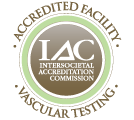Vascular Disease
Vascular Disease – Quick Facts
Vascular disease is a term used to classify a number of conditions that affect your circulatory system. Ranging from abnormalities in your arteries and veins to lymph vessels and blood flow, it can cause severe disability, even death. Diagnosis can be difficult as there are a variety of symptoms. Treatment also varies according to the type of vascular disease.
Some Types of Vascular Disease
- Peripheral artery disease (PAD): This occurs when plaque buildup in the arteries that supply blood to the arms and leg causes them to narrow or become blocked.
- Renal artery stenosis: This refers to the narrowing of renal arteries that carry blood to the kidneys from the aorta. In some cases, it may also be a birth defect.
- Buerger’s disease: Small and medium-sized blood vessels (typically in the fingers, hands, feet and toes) get inflamed or swell and become narrow, or are blocked by blood clots.
- Raynaud’s disease: The affected individual experiences spasms in the fingers and toes caused by a rare disorder of constriction in the peripheral blood vessels when cold.
- Disseminated intravascular coagulation: This is a condition where there is a widespread activation of clotting in the smaller blood vessels.
- Peripheral venous disease: When valves inside your veins become damaged, they may not close completely, which can cause blood to flow in both directions, or stick to the sides of the vessel walls and form clots.
- Varicose veins: Varicose veins, caused by damaged valves inside them, are bulging, swollen, purple, and ropy in appearance. They are more common in women than men and are often genetic. They can also be caused by changes during pregnancy, being overweight, or by standing for long periods of time.
- Blood clotting disorders: Blood clotting disorders are conditions that make the blood more likely to form clots in the arteries and veins. These conditions may be inherited (congenital, occurring at birth) or acquired during life.
- Lymphedema: This is an abnormal build up of fluid that causes swelling, most often in the arms or legs. This may happen when lymph vessels or nodes are missing, damaged, or removed.
What are the Risk Factors of Vascular Disease?
You are more likely to have vascular disease as you get older. Other factors that can increase your risk of developing it include:
- A family history of heart or vascular diseases
- Pregnancy
- Illness or injury
- Sitting or standing still for long periods of time
- Diabetes
- High cholesterol
- A condition that affects the heart and blood vessels
- Smoking
- Obesity
- An unhealthy diet
- Lack of exercise
Symptoms and Signs of Vascular disease
Symptoms of vascular disease vary according to type. A person with cardiovascular disease, for instance, might suffer chest pains while an individual with PAD can experience pain or numbness in the legs. Although it most commonly affects arteries of the heart, brain and legs, it can also affect other organs like your kidneys or eyes. Parts of the body that are affected by PAD have an inadequate blood supply and can suffer tissue damage or worse still, tissue death.
Diagnosis and Treatment of Vascular Disease
Diagnosis of vascular disease is based on medical history and the symptoms that you experience. Your physician may conduct a physical exam, assess your medical history, and then send you for further diagnostic tests to determine or confirm your condition and treatment. The testing is non-invasive and in some cases, an ultrasound is used. Most patients report little or no discomfort during the screening.
At The Vascular Experts, we conduct a thorough evaluation and offer a full range of treatments to effectively manage your condition. Our surgeons are board-certified and have extensive experience with even the most complicated cases of vascular disease. Many of our surgeons have led the way in advanced treatments for vascular disease.
We rely on state-of-the-art facilities and a dedicated team to provide you with the best quality care. We also do as many tests and procedures in our clinics for your comfort and convenience. Your doctor will explain your condition and treatment plan as well as answer any questions you may have.



